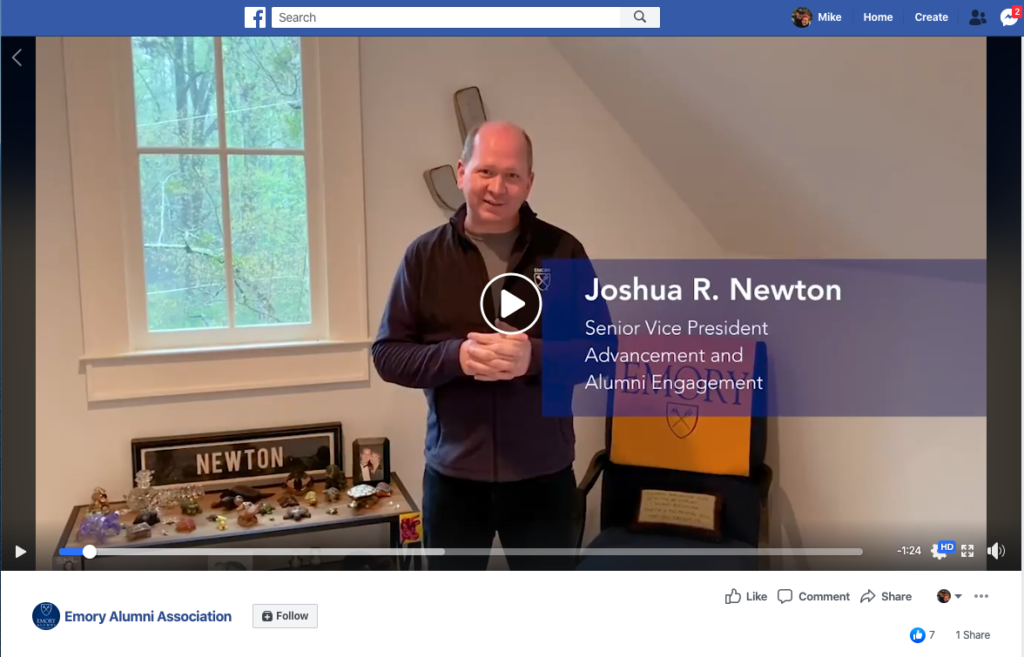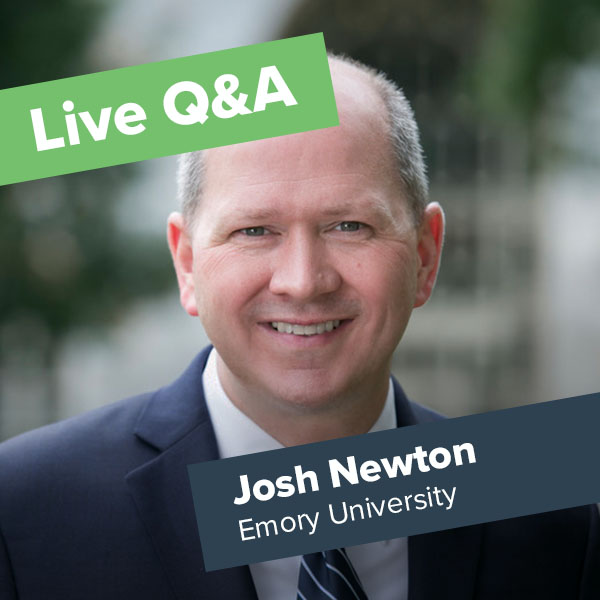Josh Newton, SVP of Advancement and Alumni Engagement at Emory University, joined our CEO Brent Grinna for a live conversation about how he’s leading his team, doubling down on digital engagement, and keeping major gift conversations going during these crazy times.

Advancement and alumni engagement regain momentum
Things have changed dramatically and quickly during the COVID-19 crisis. Two weeks ago, Emory started promoting of its Giving Day. Two days later, the college announced it would be suspending in-person classes. Emory hit pause on the giving program and then, by the end of the week, announced that its entire advancement team would begin working remotely for the foreseeable future. That’s how fast things shifted.
It’s important to remember that each day brings new developments and challenges. Every advancement team is working to figure out what to do next.
After spending its first week handling the shift to remote work, Emory is looking forward. On a weekly basis, they’re sharing information with top donors to keep them close. They’re hosting regular chats with infectious disease expert Dr. Carlos del Rio on Facebook (which have been watched by tens of thousands of people). They launched a series of webinars to help alumni improve their LinkedIn profiles, become good digital citizens in a fully online world, and to support working families. And they’re starting to promote student emergency funds and the medical center on social media. Josh even recorded his own update for the alumni community, right from his home office.
“We’ve continued to evolve, but much of our conversations have moved from what’s impacting us now to what we want all of us to cover over the next two months as we look forward,” Josh said.

Major gift conversations during COVID-19
Emory’s development officers have been focused on portfolio maintenance — checking in with donors, updating data and proposal information — while they’ve made the shift to working remotely.
“We’re not being as proactive in our gift conversations. We’re really allowing those to be driven by the donors,” Josh said. “We have been fortunate that we’ve had a few gifts continue to close, but I’ll be very candid and say that the majority of our gift conversations at the six-figure level and above have been pushed.”
That doesn’t mean they’ve put a stop to fundraising. Emory is letting the donors guide the discussion. For example, Josh shared the story of two of his prospects, both of whom were in the final stages of completing $1 million gifts right before the coronavirus outbreak.
He reached out to both as a check-in to see how they were doing. The first shared how he was actually recovering from COVID-19, then asked for his proposal signature page — that gift closed last week. Whereas the second donor wants to wait until things are more settled.
Right now, it’s all about letting the prospects guide each conversation. Fundraisers should be active, listening, and available without forcing gift conversations.
How to handle major gift fundraising in the coming weeks
Josh and the team are watching the stock market, knowing where it lands can affect both the net worth of prospects and their overall confidence in the economy and willingness to give.
“I — like the rest of us — am watching the market on a daily basis,” he said. “If the market bounces, I’m willing to be a little more aggressive six weeks from now with [major gift] conversations conversation. If the market is flat or down 6-7,000 points, depending on the donor I’m working with, I will continue to have that ‘How are you doing?’ conversation before I push again.”
We don’t know what the future holds. This week, stocks are soaring after freefalling the week before. If the rebound continues, fundrasiers can be a little more aggressive a little sooner and still make an impact in FY20.
Don’t ask to ask — respond to what prospects are asking
Emory Healthcare and the Emory University Hospital are leading healthcare organizations. Josh and his team have seen an overwhelming response from donors who want to support the doctors, nurses, and staff on the frontlines of caring for patients affected by the coronavirus.
So they’ve pivoted quickly to provide new ways for these donors to give and get involved.
“We have healthcare workers working around the clock and we were spending a ton of money feeding them,” Josh said. “We’ve had donors step forward — alumni and friends alike. These are people who are now not only feeding our workers, but supporting programs to give boxed meals for a family for healthcare workers to take home. That would never have been a solicitation strategy before. Now, you find yourself going beyond the margins of what you ordinarily might haveve considered and who you might have solicted because of this moment. We’re trying to give people an outlet for giving right now. They’re looking for ways to be a part of this.”
We’ll continue talking to leaders about how their teams are tackling fundraising and engagement during the COVID-19 pandemic. Add the series to your calendar and you’ll have access to every conversation.
Here’s EverTrue’s take on the novel coronavirus pandemic and its impact on advancement: We don’t have all the answers, but we’re going to learn from each other and share best practices for remote fundraising, working from home, managing fundraisers remotely, and handling uncertainty. Bookmark this page and subscribe for ongoing updates.
